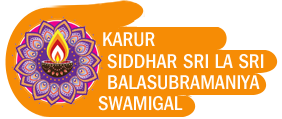Scriptures
About Siddhar’s (Siddha’s)
Who is a siddha ? A siddha is one who has attained siddhi, i.e. “power, prowess, strength, ability”, then a special kind of psychic and supernatural, miraculous, occult power. There are eight kinds of super natural powers called as “Ashtama Siddhis”.
- Anima (shrinking) — Power of becoming the size of an atom and entering the smallest beings.
- Mahima (illimitability) — Power of becoming mighty and co-extensive with the universe. The power of increasing one’s size without limit.
- Lagima (lightness) — Capacity to be quite light though big in size.
- Garima (weight) — Capacity to weigh heavy, though seemingly small size.
- Prapthi (fulfillment of desires) — Capacity to enter all the worlds from Brahma Loga to the neither world. It is the power of attaining everything desired.
- Prakasysm (irresistable will) — Power of disembodying and entering into other bodies (metempsychosis) and going to heaven and enjoying what everyone aspires for, simply from where he stays.
- Isithavam (supremacy) — Have the creative power of God and control over the Sun, the moon and the elements and
- Vasithavam (dominion over the elements) — Power of control over King and Gods. The power of changing the course of nature and assuming any form.
A classical definition of siddhas is given by Siddhar Thirumoolar: “Those who live in yoga and see the divine light and power through yoga are the siddhars (Tamil Chittar)”.
According to Kamil Zvelebil, there are some features which are typical for all or almost all siddhars as a body of thinkers.
- First, in sharp opposition to the bhakti tradition, they refuse to allow themselves be carried away by idol worship in particular temples.
- Second, in contrast to bhakti which emphasizes passionate devotion to God, the siddhar emphasize knowledge, yoga practice, and character, moral behavior, right conduct. Anger, lust and egoism are the worst sins.
- Third, almost all siddhar’s raise a protest against caste and casteism.
The whole atmosphere of siddha thinking is empirical and experimental. Their writings are not in the nature of clear cut formalized statements of any well defined doctrine. Hence, it is difficult to extricate a philosophical system out of their writings, at least at the present state of our knowledge of their works. However, it is possible to point out a few essential features, and one day, when their writings are better known, it should be possible to state their philosophy more explicitly.
The 18 Siddhars
There are 18 siddhars in the tamil siddha tradition. Each of the siddhars had lived in varied places under different names. The following are most common names of the 18 siddhars. They are listed in the order of their time period.
1.Sri Pathanjali Siddhar,2.Sri Agasthiar Siddhar,3.Sri Kamalamuni Siddhar,4.Sri Thirumoolar Siddhar,5.Sri Kuthambai Siddhar,6.Sri Korakkar Siddhar,7.Sri Thanvandri Siddhar,8.Sri Sundaranandar Siddhar,9.Sri Konganar Siddhar,10.Sri Sattamuni Siddhar,11.Sri Vanmeegar Siddhar,12.Sri Ramadevar Siddhar,13.Sri Nandeeswarar Siddhar,14.Sri Edaikkadar Siddhar,15.Sri Machamuni Siddhar,16.Sri Karuvoorar Siddhar,17.Sri Bogar Siddhar,18.Sri Pambatti Siddhar

